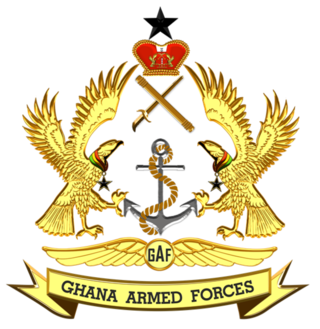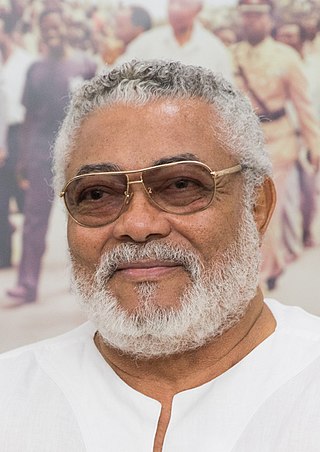
The Ghana Armed Forces (GAF) is the unified armed force of Ghana, consisting of the Army (GA), Navy (GN), and Ghana Air Force.

Politics of Ghana takes place in a framework of a presidential representative democratic republic, whereby the President of Ghana is both head of state and head of government, and of a two party system. The seat of government is at Golden Jubilee House. Executive power is exercised by the government. Legislative power is vested in both the government and Parliament. The judiciary is independent of the executive and the legislature.

The Republic of Ghana is named after the medieval West African Ghana Empire. The empire became known in Europe and Arabia as the Ghana Empire after the title of its Emperor, the Ghana. The empire appears to have broken up following the 1076 conquest by the Almoravid General Abu-Bakr Ibn-Umar. A reduced kingdom continued to exist after Almoravid rule ended, and the kingdom was later incorporated into subsequent Sahelian empires, such as the Mali Empire several centuries later. Geographically, the ancient Ghana Empire was approximately 500 miles (800 km) north and west of the modern state of Ghana, and controlled territories in the area of the Sénégal River and east towards the Niger rivers, in modern Senegal, Mauritania and Mali.

Jerry John Rawlings was a Ghanaian military officer and politician who led the country for a brief period in 1979, and then from 1981 to 2001. He led a military junta until 1992, and then served two terms as the democratically elected President of Ghana.
Lieutenant General Akwasi Amankwaa Afrifa was a Ghanaian soldier, farmer, traditional ruler and politician. He was the head of state of Ghana and leader of the military government in 1969 and then chairman of the Presidential Commission between 1969 and 1970. He continued as a farmer and political activist. He was elected a member of Parliament in 1979, but he was executed before he could take his seat. He was executed together with two other former heads of state, General Kutu Acheampong and General Fred Akuffo, and five other generals, in June 1979. He was also popularly referred to by his title Okatakyie Akwasi Amankwaa Afrifa and was in addition the abakomahene of Krobo in the Asante-Mampong Traditional Area of the Ashanti Region of Ghana.

John Evans Fiifi Atta Mills was a Ghanaian politician and legal scholar who served as President of Ghana from 2009 until his death in 2012. He was inaugurated on 7 January 2009, having defeated the governing party candidate Nana Akufo-Addo in the 2008 Ghanaian presidential election. He was previously the Vice-President from 1997 to 2001 under President Jerry Rawlings, and he contested unsuccessfully in the 2000 and 2004 presidential elections as the candidate of the National Democratic Congress (NDC). He was the first Ghanaian head of state to die in office.

Nana Addo Dankwa Akufo-Addo is a Ghanaian politician who has served as the president of Ghana since 2017. He previously served as Attorney General from 2001 to 2003 and as Minister for Foreign Affairs from 2003 to 2007 under the Kufuor-led administration.

William Ofori Atta, popularly called "Paa Willie", was a founding member of the United Gold Coast Convention (UGCC) and one of the founding fathers of Ghana, as one of "The Big Six" detained by the British colonial government in the then Gold Coast. He later became a Minister for Foreign Affairs in Ghana's second republic between 1971 and 1972.
For the rapper with the same birth name, see V.I.C.
Albert Kwadwo Adu Boahen was a Ghanaian academic, historian, and politician. He was an academic at the University of Ghana from 1959 to 1990, from 1971 onwards as a professor. As a politician, he notably was a candidate in the 1992 Ghanaian presidential election, representing the main opposition New Patriotic Party.

A referendum on the system of government was held in Ghana on 30 March 1978.
Frank George Bernasko was a Ghanaian soldier, lawyer, and politician. He served as the Commissioner of Agriculture among others in the National Redemption Council (NRC) military government of General I.K. Acheampong. He was also the founder and leader of the erstwhile Action Congress Party and contested the presidential election in 1979.
Imoru Ayarna was a Ghanaian businessman and politician. He was the founder and leader of the erstwhile People's Action Party in Ghana.
1970s in Ghana details events of note that happened in Ghana in the years 1970 to 1979.
Commodore Stephen Obimpeh is a Ghanaian politician and former officer in the Ghana Navy. He served as Chief of Naval Staff of the Ghana Navy from June 1979 to December 1981.
Kofi Badu was a Ghanaian politician and journalist. He served as a member of parliament during Ghana's first republic and a minister of state during the Supreme Military Council (SMC) era and the Armed Forces Revolutionary Council (AFRC) era. As a journalist, he was editor for various newspapers.

The Political history of Ghana recounts the history of varying political systems that existed in Ghana during pre-colonial times, the colonial era and after independence. Pre-colonial Ghana was made up of several states and ethnic groups whose political system was categorized by 3 main administrative models; Centralized, Non-centralized and Theocratic states. In the colonial era, the British Empire employed different forms of government among its four territorial possessions in the Gold Coast. Indirect rule was implemented in the late 19th century after its success in Northern Nigeria. From the 1940s, native Ghanaians yearned for more autonomy. This resulted in the several constitutional reforms as well as the creation of the office of the Prime Minister in 1952.
Joseph Kwame Kingsley-Nyinah was a Ghanaian judge who served as a justice of the Court of Appeal and also as the Electoral Commissioner for Ghana.










